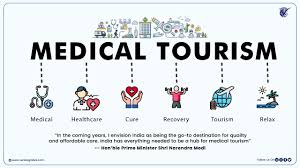
Exploring the World of Medical Tourism: A Global Healthcare Journey
The Rise of Medical Tourism: A Global Healthcare Phenomenon
Medical tourism, the practice of traveling abroad to receive medical treatment, has seen a significant rise in popularity in recent years. With advancements in technology, increased globalization, and rising healthcare costs in many countries, more individuals are exploring the option of seeking healthcare services overseas.
One of the primary reasons driving the growth of medical tourism is cost savings. Many countries offer medical procedures at a fraction of the cost compared to developed nations, making treatments more affordable for patients. This cost advantage has made medical tourism an attractive option for individuals seeking elective procedures, such as cosmetic surgery, dental work, and fertility treatments.
Aside from cost considerations, another factor contributing to the appeal of medical tourism is access to high-quality care. Many hospitals and healthcare facilities in popular medical tourism destinations boast state-of-the-art equipment and renowned medical professionals who provide top-notch care. Patients can benefit from specialized treatments and procedures that may not be readily available in their home countries.
Moreover, medical tourism offers patients the opportunity to combine healthcare with travel and leisure. Many individuals choose to undergo treatment in exotic locations or tourist destinations, allowing them to recuperate in a peaceful and scenic environment while enjoying a vacation experience.
However, while medical tourism presents numerous benefits, it also comes with potential risks and challenges. Patients must thoroughly research their options, verify the credentials of healthcare providers abroad, and consider factors such as language barriers, cultural differences, and post-operative care arrangements.
In conclusion, medical tourism represents a growing trend in global healthcare that offers patients access to affordable treatment options, world-class care, and unique travel experiences. As this industry continues to evolve and expand, it is essential for patients to approach medical tourism with caution and diligence to ensure a safe and successful healthcare journey.
9 Compelling Benefits of Medical Tourism: Quality Care and Cost Savings Abroad
- Cost savings compared to domestic healthcare services
- Access to high-quality medical treatments and procedures
- Availability of specialized care not easily found in home countries
- Opportunity to combine medical treatment with travel and leisure
- Shorter wait times for elective procedures
- Privacy and confidentiality in a foreign healthcare setting
- Exposure to different healthcare practices and innovative treatments
- Ability to explore alternative or holistic healthcare options abroad
- Potential for post-treatment recovery in a peaceful or scenic environment
Challenges of Medical Tourism: Navigating Language Barriers, Cultural Differences, Legal Risks, and Travel Logistics
- Language barriers may pose communication challenges between patients and healthcare providers.
- Cultural differences in medical practices and patient care standards could lead to misunderstandings or dissatisfaction.
- Limited legal recourse in case of medical malpractice or complications arising from treatment abroad.
- Travel-related stress and logistical issues, such as visa requirements, transportation, and accommodation arrangements, can add complexity to the healthcare experience.
Cost savings compared to domestic healthcare services
One significant advantage of medical tourism is the cost savings it offers compared to domestic healthcare services. Patients can access high-quality medical treatments and procedures at a fraction of the cost they would incur in their home countries. This affordability aspect makes medical tourism an attractive option for individuals seeking elective procedures or specialized treatments, allowing them to receive quality care without breaking the bank. The opportunity to save on healthcare expenses while still receiving excellent medical services is a compelling reason why many people choose to explore medical tourism as a viable healthcare solution.
Access to high-quality medical treatments and procedures
Medical tourism provides individuals with unparalleled access to high-quality medical treatments and procedures that may not be readily available in their home countries. Patients can benefit from state-of-the-art facilities, cutting-edge technology, and renowned medical professionals in popular medical tourism destinations. This pro of medical tourism ensures that patients receive top-notch care and specialized treatments, ultimately enhancing their health outcomes and overall well-being.
Availability of specialized care not easily found in home countries
One significant advantage of medical tourism is the availability of specialized care that may not be easily found in patients’ home countries. Many popular medical tourism destinations boast state-of-the-art facilities and renowned medical professionals who specialize in niche treatments and procedures. Patients seeking specialized care, such as advanced cancer treatments, organ transplants, or cutting-edge surgeries, can benefit from accessing expertise that may not be readily available or affordable in their own healthcare systems. Medical tourism offers individuals the opportunity to receive tailored and innovative treatments that can significantly improve their health outcomes and quality of life.
Opportunity to combine medical treatment with travel and leisure
Medical tourism offers patients the unique advantage of combining necessary medical treatment with travel and leisure experiences. This pro allows individuals to undergo healthcare procedures in desirable destinations, providing them with the opportunity to recuperate in a relaxing and scenic environment while also enjoying a vacation. By merging medical care with travel and leisure activities, patients can enhance their overall well-being and recovery process, making the healthcare journey more enriching and fulfilling.
Shorter wait times for elective procedures
One significant advantage of medical tourism is the shorter wait times for elective procedures. In many countries, healthcare systems face long waiting lists for non-urgent treatments, causing delays in receiving necessary care. By opting to travel abroad for elective procedures, patients can bypass these extensive wait times and schedule their treatments promptly. This not only allows individuals to address their health needs more efficiently but also reduces the stress and uncertainty associated with prolonged waiting periods.
Privacy and confidentiality in a foreign healthcare setting
One significant advantage of medical tourism is the assurance of privacy and confidentiality in a foreign healthcare setting. Patients seeking treatment abroad can benefit from a sense of anonymity and discretion, away from their familiar surroundings. This can be particularly appealing for individuals undergoing sensitive procedures or seeking treatments for stigmatized conditions. Foreign healthcare facilities often adhere to strict privacy regulations and ethical standards, ensuring that patient information remains confidential throughout the treatment process. This level of privacy protection can offer peace of mind to patients while they focus on their health and well-being in a secure and respectful environment.
Exposure to different healthcare practices and innovative treatments
Medical tourism provides patients with the valuable opportunity to be exposed to a diverse range of healthcare practices and innovative treatments that may not be readily available in their home countries. By seeking medical care abroad, individuals can access cutting-edge procedures, advanced technologies, and alternative treatment approaches that can offer new perspectives on their health conditions. This exposure not only broadens patients’ knowledge and understanding of healthcare but also opens doors to potential breakthroughs in medical science and personalized care.
Ability to explore alternative or holistic healthcare options abroad
One significant advantage of medical tourism is the ability for individuals to explore alternative or holistic healthcare options abroad. Many countries offer a diverse range of traditional and complementary medicine practices that may not be widely available in their home countries. By seeking treatment overseas, patients have the opportunity to experience different healing modalities, such as acupuncture, Ayurveda, or traditional Chinese medicine, which can complement conventional medical treatments and promote overall well-being. This exposure to alternative healthcare options not only expands patients’ treatment choices but also allows them to benefit from a more holistic approach to health and healing.
Potential for post-treatment recovery in a peaceful or scenic environment
One significant advantage of medical tourism is the potential for post-treatment recovery in a peaceful or scenic environment. Patients have the opportunity to heal and recuperate in a tranquil setting, away from the stressors of everyday life. Being surrounded by natural beauty or cultural richness can enhance the healing process, promoting relaxation and well-being. This unique aspect of medical tourism not only supports physical recovery but also contributes to mental and emotional rejuvenation, providing patients with a holistic approach to their health journey.
Language barriers may pose communication challenges between patients and healthcare providers.
Language barriers in medical tourism can present significant challenges for patients seeking healthcare services abroad. Effective communication between patients and healthcare providers is crucial for ensuring accurate diagnosis, understanding treatment options, and receiving proper care. Misunderstandings due to language differences can lead to errors in medical procedures, medication dosage, and post-operative instructions, potentially compromising the quality of care and patient safety. Overcoming language barriers in medical tourism requires careful consideration, such as utilizing interpreter services or selecting healthcare facilities with multilingual staff to facilitate clear communication and enhance the overall patient experience.
Cultural differences in medical practices and patient care standards could lead to misunderstandings or dissatisfaction.
One significant con of medical tourism is the potential for cultural differences in medical practices and patient care standards, which could result in misunderstandings or dissatisfaction among patients. Patients seeking treatment abroad may encounter healthcare practices that differ from those they are accustomed to in their home countries, leading to confusion or discomfort. Additionally, varying patient care standards across different regions may impact the quality of care received and could result in discrepancies in expectations versus reality. It is crucial for individuals considering medical tourism to thoroughly research and understand the cultural nuances of their chosen destination to mitigate these risks and ensure a positive healthcare experience.
Limited legal recourse in case of medical malpractice or complications arising from treatment abroad.
One significant con of medical tourism is the limited legal recourse available to patients in case of medical malpractice or complications arising from treatment received abroad. When seeking healthcare services in a foreign country, patients may face challenges in pursuing legal action against healthcare providers due to differences in legal systems, jurisdictional issues, and varying standards of care. This lack of legal protection can leave patients vulnerable and without adequate avenues for seeking redress in the event of adverse outcomes or negligence during their medical treatment overseas.
Travel-related stress and logistical issues, such as visa requirements, transportation, and accommodation arrangements, can add complexity to the healthcare experience.
Travel-related stress and logistical issues associated with medical tourism can pose significant challenges for patients seeking healthcare abroad. Navigating visa requirements, arranging transportation, and securing suitable accommodation can add layers of complexity to the already daunting task of undergoing medical treatment in a foreign country. The need to manage these logistical aspects effectively can detract from the focus on health and well-being, potentially causing additional stress and anxiety for patients. It is crucial for individuals considering medical tourism to carefully plan and address these travel-related concerns to ensure a smoother and more successful healthcare experience.


